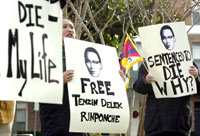




WASHINGTON—A Chinese court has spared the life of a Tibetan monk sentenced to death in connection with a series of bombings in southwestern China blamed on supporters of Tibetan independence. Tenzin Delek Rinpoche, whose case sparked an international outcry, will spend the rest of his life in prison.
The Sichuan Province high court announced the verdict in a hearing Jan. 26, China’s official Xinhua news agency reported. Tenzin Delek Rinpoche, in his 50s, has been at the center of campaign by international human rights groups to have his death penalty—suspended for two years ending in December—commuted to life.
Xinhua said the court had commuted the sentence because Tenzin Delek Rinpoche obeyed unspecified legal conditions during the two-year reprieve. In January 2003, Tenzin Delek Rinpoche made an audio tape that was smuggled out of prison to RFA’s Tibetan service, in which he reiterated his innocence.
The U.S. Senate passed a resolution in December urging China to release the jailed monk and other political prisoners, but China rejected the appeal.
Another man, Lobsang Dhondup, was simultaneously sentenced to death in the same case and executed on Jan. 26, 2003.
Another monk and aide to Tenzin Delek Rinpoche, Tashi Phuntsok, has meanwhile been released. He was arrested in 2002 after travelling to Beijing to appeal for his teacher’s release. Tashi Phuntsok was chief monk in charge of discipline at Tenzin Delek Rimpoche's monastery in Nyakchuka at the time of his arrest.
U.S-based Human Rights Watch described Tashi Phuntsok as Tenzin Delek Rinpoche’s right-hand man and said he left prison "a broken man," unable to walk or speak clearly.
Detained 10 days after Tenzin Delek Rinpoche, "Tashi Phuntsok entered prison as a healthy man in his early 40s, and he was cast out literally as a broken man," said Brad Adams, Asia director for Human Rights Watch.
At least 60 of Tenzin Delek Rinpoche’s associates were detained for questioning over the case but only one remains behind bars, Lobsang Taphel, a local businessman who has served 18 months of his five-year term, Adams said. The official charges against him are unknown.
On Nov. 19, 2004, a spokeswoman for the U.S. State Department voiced serious concern about Tenzin Delek Rinpoche’s closed-door trial in 2002.
The United States has stressed "the need to provide clear and convincing evidence of guilt in all capital cases and noted widespread international concern over Tenzin Delek [Rinpoche’s] case," spokeswoman Darla Jordan told Radio Free Asia (RFA).
"The United States has been following the case of Tenzin Delek Rinpoche very closely since learning of his arrest in connection to several bombings in Sichuan Province and China’s imposition of the death sentence in this case," she said.
The trials of both Lobsang Dhondup and Tenzin Delek Rinpoche were closed to the public on "state secrets" grounds, and they were denied due process, including access to adequate representation.
"We have emphasized the need to provide clear and convincing evidence of guilt in all capital cases and noted widespread international concern over Tenzin Delek’s case. No individual should be detained solely for expressing personal views or engaging in other peaceful legitimate activities.”
In its 2003 report on human rights around the world, the U.S. State Department said the Chinese government’s human rights record in Tibetan areas of China "remained poor, although some positive developments continued."
"The trials of both Lobsang Dhondup and Tenzin Delek Rinpoche were closed to the public on ‘state secrets’ grounds, and they were denied due process, including access to adequate representation," the report said.
"Lobsang Dhondup's execution the same day he lost his appeal to the Sichuan Provincial Higher People's Court, as well as the failure of the national-level Supreme People's Court to review the case as promised to foreign officials, raised serious concerns in the international community."